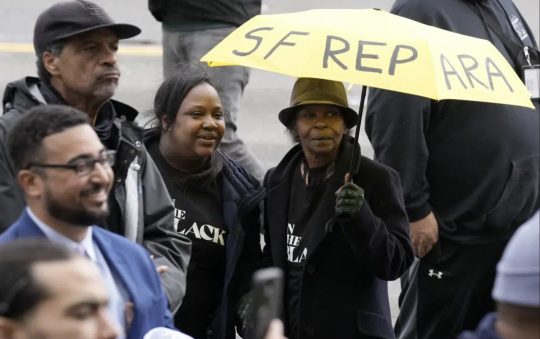
During a star-studded evening complete with a Red Carpet entry at the Newseum in Washington, D.C., Comcast formally announced the addition of two television networks that highlights the company’s commitment to diversity.
TV One’s Cleo TV and Afrotainment’s Afro are the latest independent channels to receive broad distribution on Comcast’s cable systems.
“African Americans have stories to tell and we’re not monolithic people, we come from different backgrounds,” said Michelle Rice, the general manager at Cleo TV.
“I’m excited that this is by us, for us and there’s going to be a lot of great content that reflects our lifestyle,” said Rice, who joined cast members from various Cleo TV shows, executives from Comcast Afro and others to celebrate the launch of the new channels at the Newseum on Thursday, March 14.
Cleo TV is billed as a lifestyle and entertainment network that targets millennial and Gen X women of color.

Derived from the name Cleopatra, one of the most powerful, trendsetting, rule-breaking and iconic women in history, Rice said Cleo will offer quality content that “defies negative and cultural stereotypes of today’s modern women.”
Rice, a TV One veteran, has overseen and led all business, operational and creative aspects of the network and she’s also credited with green-lighting and premiering successful series like “Uncensored,” “We’re the Campbells,” and “ATL Homicide.”
Among the many duties at TV One, Rice handled domestic and international program sales and distribution for the network.
“We’ve put together upbuilding and aspiration entertainment for millennial and GEN X women of color. We all recognized that there were still more room for quality content for GEN X and women of color,” Rice said.
Meanwhile, Afro also offers a culturally diverse peek into the global black community, said Yves Bollanga, the CEO and founder of Afrotainment.
“Afro celebrates the richness and diversity of the black culture with original and exclusive content. It is important to recognize that the African-American community is not a homogeneous group. … They are Afro Caribbeans, Africans or Afro Hispanos who are young, educated, greatly underserved and represent substantial long-term revenue growth opportunities,” Bollanga said.
“We are excited to showcase all shades of the black culture to millions of Xfinity viewers both live and on demand,” he said.
When Bollanga moved to the United States from Cameroon in 2000, he said he turned on the television and immediately noticed a void for black viewers.
“There was nothing that really looked like us or captured our culture,” he said.
“I felt this unfulfilled demand for Black content and our vision was and continues to be to produce and broadcast Afro-centric original content to as many devices and households as we possibly can.”
Bollanga previously founded several media companies, one of which is AB ROLL, a video production company based in France.
He also co-founded Telesud with a childhood friend, Constant Nemale.
Telesud was the first Pan-African TV channel in Europe and Africa.
In 2005, under Bollanga’s leadership, Telesud launched in America on DISH.
Later, he partnered with Shafquat Chaudhary to found Afrotainment and the company now features 10 channels: Afro, Afrotaiment, Afrotainment Plus, Africa Box Office, Haiti HD, TV Naija, Yebo, Oui TV, Afrotainment Music, Afro Sports.
“Comcast is excited to add both Afro and Cleo TV,” said Keesha Boyd, the Executive Director, Multicultural Products at Comcast Cable.
“We remain committed to delivering a wide array of programming by partnering with independent networks, such as [Cleo and Afro], to better serve our increasingly diverse customer base,” said Boyd, who was among the many to attend the launch at the Newseum.
Attendees included Urban One Founder Cathy Hughes, Sister Circle hosts Rashan Ali and Syleena Johnson; singer Brave Williams; Project Runway winner Liris Crosse, Chef JJ and April Reign of “Cleo Speaks.”
After evaluating more than 50 proposals, Comcast said in choosing Cleo and Afro that its main criteria were the content of the network; whether the network was fully financed; and whether the network’s ownership and/or management group(s) are well established, have relevant experience, and are substantially owned by African-Americans.
“The offerings from both Afro and Cleo TV serve as an excellent complement to the growing catalog of programming choices we offer about global black communities,” Boyd said.







